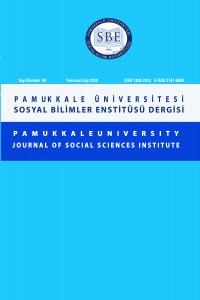Abstract
Hesiod’s Theogony is composed of several myths about the origins of gods and
men with an emphasize on the turning points in their relations. It is clear
that Theogony is a collection of
common narrations of oral tradition. What makes it significant is that it is a
first attempt to gather all these myths together in a written form. However,
writing them down means giving them a stabilized form and content as well.
Shaped in accordance with the political and social realities of his time,
Hesiod’s narration gains an ideological character which puts the reign of Zeus
over all local gods and goddesses while praising a rational understanding and patriarchal
order in Greek society. Therefore, this paper aims to give an opinion on how to
trace the rational and patriarchal transformation of the Greek society in
Hesiod’s text and to observe how ideologies are forced upon texts through
writing process.
Keywords
References
- Arthur, M. B. (1982). “Cultural Strategies in Hesiod’s “Theogony”: Law, Family, Society”, Arethusa, Vol:15, No:1/2, 63-82, The Johns Hopkins University Press.
- Arthur, M. B. (1987). “Review: The Hesiodic Catalogue of Women: Its Nature, Structure, and Origins by M.L. West; Amazons: A Study in Athenian Mythmaking by William Blake Tyrrell”, Signs, Vol. 12, No. 3, 589-593, The University of Chicago Press Journals. URL: http://www.jstor.org/stable/3174344
- Blundell, S. (1995). Women in Ancient Greece, Harvard University Press, China.
- Clay, J. S. (1984). The Hecate of the Theogony, grbs.library.duke.edu.
- Davidson, H. R. E. (1964). Gods and Myths of Northern Europe, Oxford University Press, Oxford.
- Greene, M. T. (1992). Natural Knowledge in Preclassical Antiquity, The Johns Hopkins University Press, USA.
- Hesiod. (2007). Theogony, Forgotten Books.
- Kirk, S. (2013). “Hesiod’s Pandora: A Demoted Earth Goddess? An Overview of the Scholarship”, doi: /10.14990/00000541.
- Lamberton, R. (1988). Hesiod, Yale University Press, USA.
- Lerner, G. (1986). The Creation of Patriarchy, Oxford University Press, USA.
- Lesky, A. (1966). A History of Greek Literature, Methuen, London.
- Long, C. (2007). “The Daughters of Metis: Patriarchal Dominion and the Politics of the Between”, Graduate Faculty Philosophy Journal, Vol: 28, No:2, doi: 10.5840/gfpj20072824.
- Mason, M. K. (2009). Hesiod’s Theogony, myths and Meaning, www.moyak.com/papers/hesiod-theogony.html.
- Mondi, R. (1984). “The Ascension of Zeus and the Composition of Hesiod’s Theogony”, Greek, Roman and Byzantine Studies, Vol. 25, No:4, 325-344, http://grbs.library.duke.edu/issue/view/1151.
- Neumann, E. (1963). The Great Mother, Routledge & Kegan Paul, London.
- O’Neal, W. J. (2001). The Status of Women in Ancient Athens, University of Toledo: USA.
- Plato. (2008). Ion, Forgotten Books.
- Sihvola, J. (1989). “Decay, Progress, The Good Life? Hesiod and Protagoras on the Development of Culture”, The Finnish Society of Sciences and Letters, Helsinki..Voegelin, E. (2000). Collected Works of Eric Voegelin, University of Missouri Press, USA.
- Wilson, N.G. (2006). Encyclopedia of Ancient Greece, Routledge, New York.
- http://www.greekboston.com/culture/ancient-history/dorian-invasion/.
Abstract
Hesiod’un Theogony
eseri tanrıların ve insanların ilk hikayelerini anlatırken, tanrılar ve
insanlar arasındaki ilişkilerin dönüm noktalarını da vurgulayan pek çok mitin
bir araya gelmesi ile oluşmuştur. Theogony’nin
sözlü geleneğe ait pek çok yaygın anlatının toplamından oluştuğu açıktır. Onu
önemli kılan şey ise bu mitleri yazılı halde bir araya getiren ilk
girişimlerden oluşudur. Ancak, bu
mitleri yazıya geçirmek aynı zamanda onlara değişmez bir biçim ve içerik vermek
anlamına da gelir. Zamanının politik ve sosyal gerçekliklerine uygun biçimde
şekillendirdiği anlatımı ile Hesiod, Zeus’un hükümdarlığını tüm yerel tanrı ve
tanrıçaların üzerinde tanırken Yunan toplumunda rasyonel bir anlayışı ve
ataerkil düzeni öven ideolojik bir karakter kazanır. Bu sebeple, bu çalışmanın
amacı Hesiod’un metninde Zeus hükümdarlığı altındaki Yunan toplumunda bu
rasyonel ve ataerkil dönüşümün izlerini sürmeye yönelik bir fikir ortaya koymak
ve ideolojilerin yazıya geçirme sürecinde metinlere empoze edilişini
gözlemlemektir.
Keywords
References
- Arthur, M. B. (1982). “Cultural Strategies in Hesiod’s “Theogony”: Law, Family, Society”, Arethusa, Vol:15, No:1/2, 63-82, The Johns Hopkins University Press.
- Arthur, M. B. (1987). “Review: The Hesiodic Catalogue of Women: Its Nature, Structure, and Origins by M.L. West; Amazons: A Study in Athenian Mythmaking by William Blake Tyrrell”, Signs, Vol. 12, No. 3, 589-593, The University of Chicago Press Journals. URL: http://www.jstor.org/stable/3174344
- Blundell, S. (1995). Women in Ancient Greece, Harvard University Press, China.
- Clay, J. S. (1984). The Hecate of the Theogony, grbs.library.duke.edu.
- Davidson, H. R. E. (1964). Gods and Myths of Northern Europe, Oxford University Press, Oxford.
- Greene, M. T. (1992). Natural Knowledge in Preclassical Antiquity, The Johns Hopkins University Press, USA.
- Hesiod. (2007). Theogony, Forgotten Books.
- Kirk, S. (2013). “Hesiod’s Pandora: A Demoted Earth Goddess? An Overview of the Scholarship”, doi: /10.14990/00000541.
- Lamberton, R. (1988). Hesiod, Yale University Press, USA.
- Lerner, G. (1986). The Creation of Patriarchy, Oxford University Press, USA.
- Lesky, A. (1966). A History of Greek Literature, Methuen, London.
- Long, C. (2007). “The Daughters of Metis: Patriarchal Dominion and the Politics of the Between”, Graduate Faculty Philosophy Journal, Vol: 28, No:2, doi: 10.5840/gfpj20072824.
- Mason, M. K. (2009). Hesiod’s Theogony, myths and Meaning, www.moyak.com/papers/hesiod-theogony.html.
- Mondi, R. (1984). “The Ascension of Zeus and the Composition of Hesiod’s Theogony”, Greek, Roman and Byzantine Studies, Vol. 25, No:4, 325-344, http://grbs.library.duke.edu/issue/view/1151.
- Neumann, E. (1963). The Great Mother, Routledge & Kegan Paul, London.
- O’Neal, W. J. (2001). The Status of Women in Ancient Athens, University of Toledo: USA.
- Plato. (2008). Ion, Forgotten Books.
- Sihvola, J. (1989). “Decay, Progress, The Good Life? Hesiod and Protagoras on the Development of Culture”, The Finnish Society of Sciences and Letters, Helsinki..Voegelin, E. (2000). Collected Works of Eric Voegelin, University of Missouri Press, USA.
- Wilson, N.G. (2006). Encyclopedia of Ancient Greece, Routledge, New York.
- http://www.greekboston.com/culture/ancient-history/dorian-invasion/.
Details
| Primary Language | English |
|---|---|
| Subjects | Creative Arts and Writing |
| Journal Section | Articles |
| Authors | |
| Publication Date | June 29, 2020 |
| Acceptance Date | May 19, 2020 |
| Published in Issue | Year 2020 Issue: 40 |


